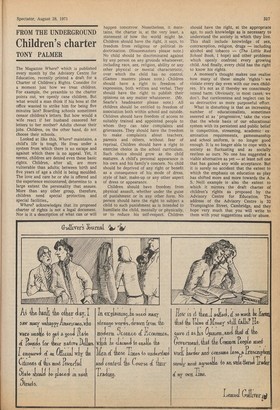FROM THE UNDERGROUND
Children's charter
TONY PALMER
The Magazine Where? which is published every month by the Advisory Centre for Education, recently printed a draft for a Charter of Children's Rights. Consider for a moment just how we treat children. For example, the preamble to the charter points out, we openly cane children. But what would a man think if his boss at the office wanted to strike him for being five minutes late? Boarding schools sometimes censor children's letters. But how would a wife react if her husband censored her letters to her mother? Adults choose their jobs. Children, on the other hand, do not choose their schools.
Looked at like this, Where? maintains, a child's life is tough. He lives under a system from which there is no escape and against which there is no appeal. Yet, it seems, children are denied even these basic rights. Children, after all, are more vulnerable than adults; between birth and five years of age a child is being moulded. The love and care he or she is offered and the experience encountered, determine to a large extent the personality that ensues. More than any other group, therefore, children need special protection and special facilities..
Where? acknowledges that its proposed charter of rights is not a legal document. Nor is it a description of what can or will happen tomorrow. Nonetheless, it maintains, the charter is, at the very least, a statement of how the world might be. Children should have the right, it says, to freedom from religious or political indoctrination. (Housemasters please note.) No child should be discriminated against by any person on any grounds whatsoever, including race, sex, religion, ability or any other physical or mental characteristic, over which the child has no control. (Games masters please note.) Children should have a right to freedom of expression, both written and verbal. They should have the right to publish their opinions on any matter whatsoever. (Mr. Searle's headmaster please note.) All children should be entitled to freedom of association both within school and outside. Children should have freedom of access to suitably trained and appointed people to whom they can take complaints and grievances. They should have the freedom to make complaints about teachers, parents and others, without fear of reprisal. Children should have a right to exercise choice in the school curriculum. Such choice should grow as the child matures. A child's personal appearance is his own and his family's concern. No child should be deprived of any right or benefit as a consequence of his mode of dress, style of hair, make-up or any other aspect of dress or appearance.
Children should have freedom from physical assault, whether under the guise of punishment or in any other form. No person should have the right to subject a child to such punishment as is intended to humiliate the child, mentally or physically, or to reduce his self-respect. Children
should have the right, at the appropriate age, to such knowledge as is necessary to understand the society in which they live. This shall include knowledge of sex, contraception, religion, drugs — including alcohol and tobacco — (The Little Red School Book, I hope) and other problems which openly confront every growing child. And finally, every child has the right to know his rights.
A moment's thought makes one realise how many of these simple 'rights' we violate every day even with our own children. It's not as if thereby we consciously intend harm. Obviously, in most case, we don't. But carelessness and neglect can be as destructive as more purposeful effort.
What is disturbing is that an increasing number of educationalists, sometimes sneered at as ' progressive,' take the view that the whole basis of our educational system with its persistent and public belief in competition, streaming, academic examination requirements, gamesmanship and school uniform, is no longer good enough. It is no longer able to cope with a society as fluctuating and as socially restless as ours. No one has suggested a viable alternative as yet — at least ncit one that has gained any wide acceptance. But it is surely no accident that the extent to which the emphasis on education as play has shifted more and more towards the A. S. Neill example is also the extent to which it mirrors the draft charter of children's rights as proposed by the Advisory Centre for Education. The address of the Advisory Centre is 32 Trumpington Street, Cambridge, and they hope very much that you will write to them with your suggestions and/or abuse.


































 Previous page
Previous page